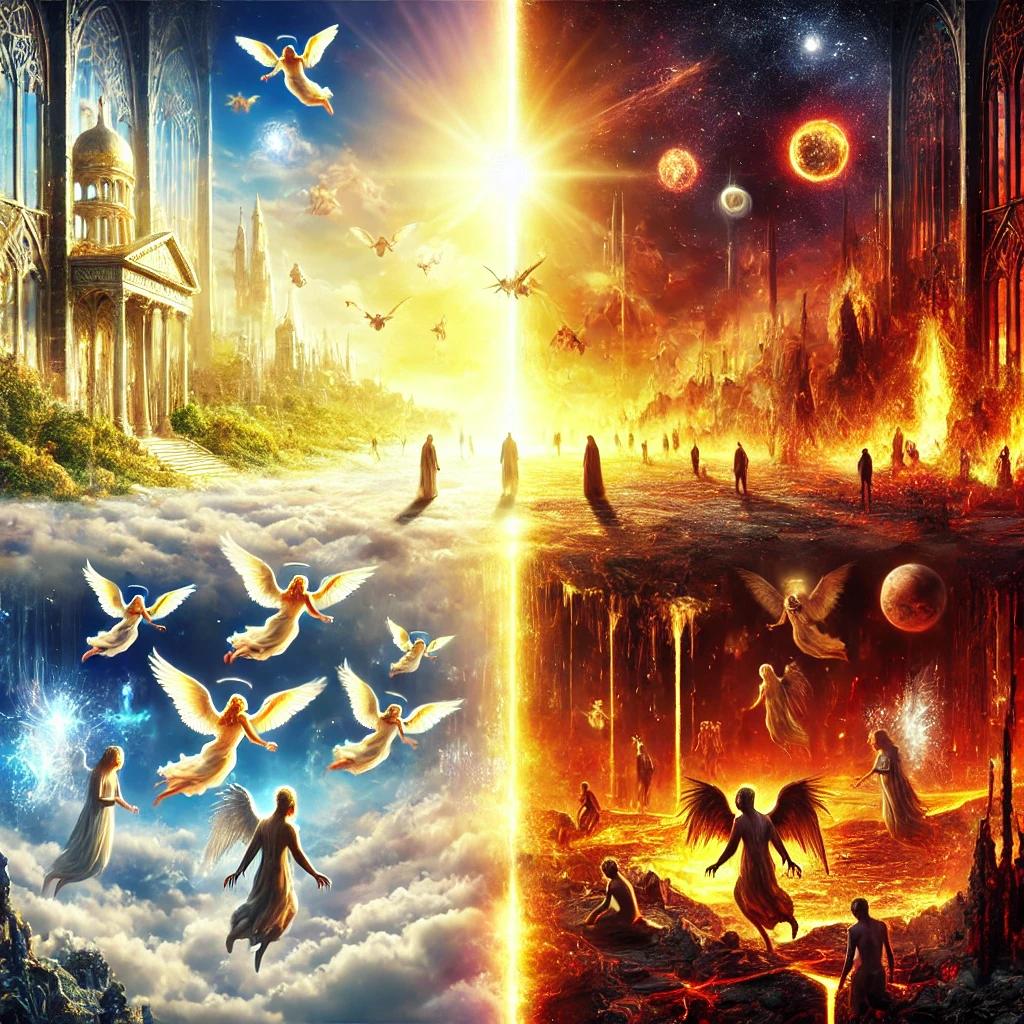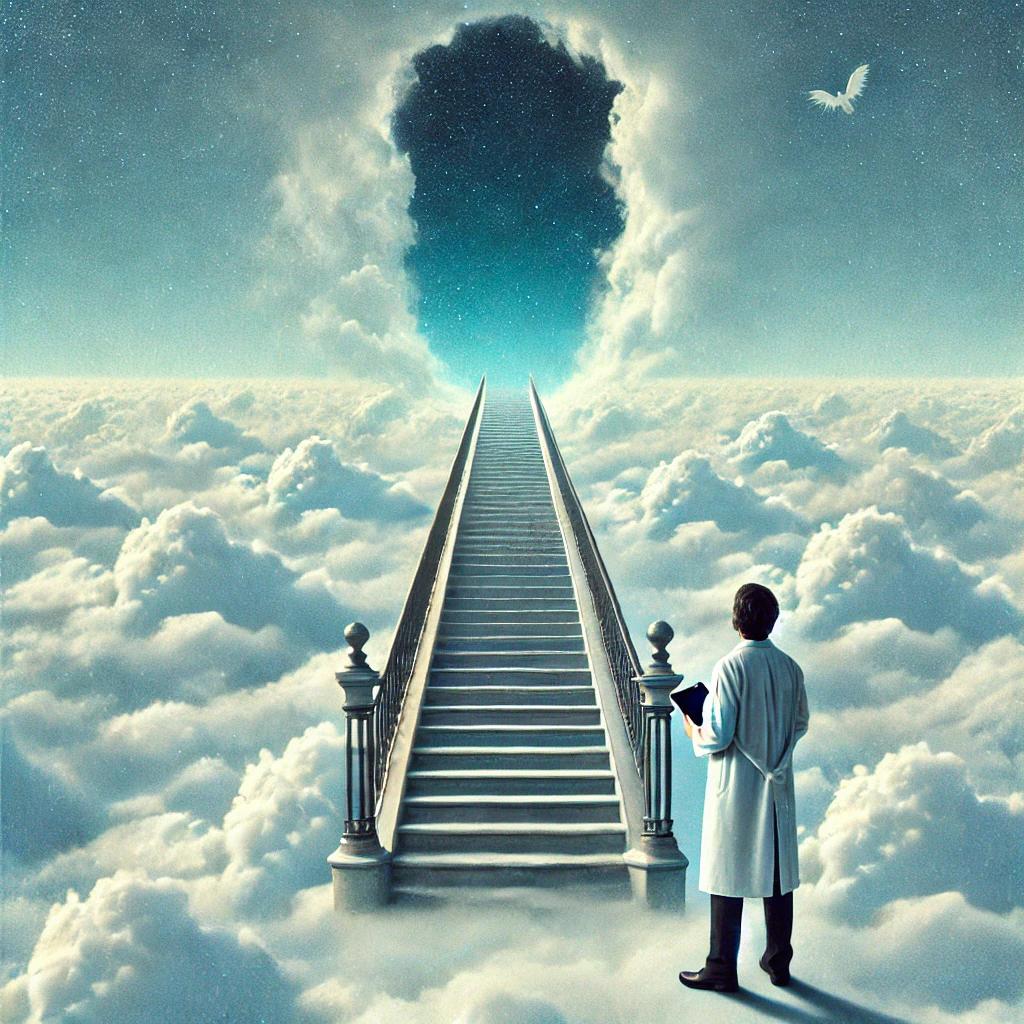I always hear songs about going to heaven and Americans strictly adhere to this nonsense. This article provides you with tons of information that is somewhat crucial in the dichotomy of why you will never see heaven. For further reading, read the book “Arguments for atheism” (Jan Bryxí, 2023).
Primitive bronze age superstition

The idea of heaven is a relic from the Bronze Age, born out of fear and ignorance. Early societies, struggling with disease, war, and famine, needed a way to cope with suffering. Heaven provided an escape, a promise that injustice in this life would be corrected in the next. But this belief was never about truth—it was about control. Rulers and priests used it to pacify the masses, ensuring obedience by offering them an afterlife they could never verify. The vision of a paradise beyond the clouds was shaped by primitive cosmology, a time when people believed the sky was a physical dome separating the human world from the divine. The concept was never based on evidence but on the psychological need to believe suffering had a purpose.
Science has since dismantled the idea. There is no cosmic paradise, no rational basis for an afterlife dictated by human morality. The laws of physics govern the universe, not divine rewards and punishments. Yet, the myth persists because it soothes existential fear, offering people a sense of purpose beyond death. But clinging to ancient superstition comes at a cost. It discourages progress, shifting focus away from improving life on Earth. Heaven was never a destination—it was a tool, designed to keep people waiting for salvation rather than demanding justice and change in the real world.
We are animals
We don’t see heaven because we are just animals driven by our selfish genes, programmed for survival, not for discovering divine truths. The belief in an afterlife, like many myths, has roots in evolutionary psychology. Early humans, facing a world of danger and uncertainty, created heaven to ease their fear of death. But nature does not reward belief—it rewards evolutionary fitness. The only reality that matters is the one where survival, adaptation, and reproduction dictate existence. We replicate—nothing more. There is no heaven for animals, and we are animals. No species before us has been granted eternal paradise, and we are no exception. Life is a cycle of birth, survival, and replication—nothing beyond that.
The belief in heaven is not a product of divine revelation but of human evolution. Early humans developed cognitive biases to interpret their world in ways that increased survival. One of these biases is agency detection—the tendency to see intentional forces behind random events. When a loved one died, it was easier to believe their spirit lived on rather than accept the finality of death. This belief reduced existential fear and helped early societies cope with grief.
Another cognitive bias is pattern-seeking—the brain’s ability to connect unrelated events. Our ancestors linked thunderstorms, famines, and victories in battle to divine intervention, reinforcing the idea of an unseen realm influencing their lives. These psychological tendencies made afterlife beliefs not only common but inevitable. Over time, societies institutionalized these ideas into religions, codifying myths about heaven and hell.
Intentional design
A related bias is the perception of complexity as intentional design. When humans see intricate patterns in nature—the movement of the stars, the structure of the human eye, or the vast interconnectedness of ecosystems—they assume someone must have made them. This is not proof of divine creation but a cognitive shortcut. The brain evolved to recognize patterns because it helps with survival (even among people: there was always an agent). Seeing a hidden predator in the grass when none is there is a harmless mistake, but failing to see a real one is deadly. The tendency to assume design where none exists leads to the belief in a grand designer, even when complexity arises naturally through evolutionary and physical processes.
Cultural evolution further reinforced these beliefs. Societies that promoted a structured afterlife gained social cohesion. Heaven became a reward for obedience, hell a punishment for defiance. Rulers and religious elites used these concepts to maintain control, ensuring that people followed moral codes by promising justice beyond death. Heaven was never a discovered truth—it was an invented tool, shaped by evolutionary psychology and social engineering.
Morality makes little sense
Who will be born out of a combination of trillions? How good life she or he will live? A child psychiatrist with lousy outcomes destroyed the lives of hundreds. You break a child’s leg and they will teach you a lesson in jail. Tell me the difference in how you act if someone murders an unknown person or your relative.
These are extremely complex relationships and the given system can be set trillions of times.
You want to belong to a social group that can impose morality (of their own) on their less powerful circles.
The moral rules are sets of competing influences (for example, buying music versus listening to it for free). We live in a capitalism where the super-rich rule. And guess what? We adhere to their rules. We take loans while they are sitting on hundreds of trillions of dollars.
Every single outcome of a given moral system should lead to infinite numbers of consciousness to the most ecstatic moments. This is a kind of utilitarianism.
Now it is up to you to choose what we are closer to more. Moral nihilism (everything goes) or my proposed systems.
Are we all going to hell? Who is going to hell? Heaven and hell overlap

Are we all going to hell? Who is going to hell? Heaven and hell overlap
People are sinful to the degree that everyone has sinned. And God seems to be really arbitrary in this question. Taking his words literally, we should all end up in hell. There is no sharp distinction. Purgatory makes only a little sense in this dichotomy.
Which morality will you be judged by? The Roman one, Slavic? Also, morality changes over time and from culture to culture.
The third problem is that heaven and hell overlap. Imagine them as an overlapping spectrum. A loving father supported charity, helped his neighbor with his car, takes care of his elderly mom, but also murdered someone and stole something. Heaven or hell, or something in between? Tough question.
Heaven and hell as a binary construct
Hell is the worst of the worst, and heaven is the best of the best. Kind of tricky. If the constructs of religion made sense, there would have been thousands of post-mortal worlds based on sinner’s behavior. Not only just something between hell and heaven but a whole different set of attributes the worlds would possess.
God and living eternally? Why not?
Being born, endless cycles of reincarnation, endless life before being born or after being born.
This makes no sense being put as small ants in this world and must have been born. Why not live eternally?
Why heaven and hell when there is no free will?
You have an IQ, personality, talents, creativity, and predispositions. Nobody sane would argue it is your free choice.
You are determined by your socioeconomic background (how affluent is your family, what country you live in).
It is the same with the brain. We live either in an inter-deterministic or deterministic world where your brain (neurons) is subject to physical laws. So your mental processes are deterministic.
God knows the past, present, and future, yet there is free will.
How would the transmission should look?
We have superb physical detection devices and well-established physical laws. Scientists can measure even the tiniest electromagnetic signals in the brain, detect subatomic particles, and analyze the vast structures of the universe. Yet, no one has ever identified any principle explaining how a deterministic, physical brain could transmit consciousness beyond itself.
For transmission to occur, there must be a medium, a signal, and a receiver. If heaven or any other non-physical realm existed as a destination, there would need to be some form of communication channel bridging the physical and the non-physical. However, no known force, wave, or quantum phenomenon has ever been observed transmitting anything resembling consciousness beyond the body. Brain activity ceases at death, and no detectable signal continues.
If such a transmission existed, we should be able to measure it. A soul or consciousness leaving the body would require energy or some unknown particle carrying information. If that energy were electromagnetic, we would detect it with sensors. If it were a new type of matter, it would interact with known physical forces. But nothing has ever been recorded. Consciousness appears entirely tied to brain activity, and when the brain stops, all detectable information ceases with it.
Lack of any known transmission principle
The lack of any known transmission principle is not just an absence of evidence—it contradicts everything we know about physics. If a new fundamental force allowed consciousness to move elsewhere, it would need to be radically different from everything in science. Yet, no experiments have ever hinted at such a force. The burden of proof remains on those who claim that such a transmission exists despite never being detected.
For heaven to exist as a real place, there must be a way for consciousness to leave the body and reach it. Yet, no scientific principle explains how this transmission could work. Consciousness is a product of neural activity—patterns of electrical and chemical processes in the brain. When the brain dies, these processes stop. There is no measurable force, energy, or wave carrying a person’s identity beyond death.
If heaven were real, there would be a clear mechanism for how souls arrive there. But no energy leaves the body at death, no signals are received from the beyond, and no transmission principle exists in physics. Consciousness does not “go” anywhere—it simply ends.
You will never see heaven: God is omniscient and knows who goes to heaven
If God knows everything, why the earthly existence? He knows how we will behave, so why not send us to a particular destination whatsoever?
In a world consisting only of Gods, where we are evolutionarily programmed to be religious (either as an adaptation or a by-product). We have a very inept explanation of how God was created. Each of them fails to do so.
Also, religion is either a by-product of an adaptation or an adaptation itself. Human brains evolved to detect patterns, infer agency, and seek social cohesion—traits that helped early societies survive. The tendency to see the intention behind events, even when none exists, led to belief in gods and spirits. Religion also reinforced group identity, promoting cooperation and reducing internal conflict, making it a useful evolutionary tool. However, it may also be a by-product of cognitive adaptations not originally meant for faith—such as our capacity for storytelling, moral reasoning, and obedience to authority. These traits evolved for survival but unintentionally gave rise to religion, shaping human culture and history.
The immorality of eternal punishment
God didn’t create Hell, but he sends them there, or who does it? Only immoral creature would destine someone for eternal hell.
There is no evidence
Not only nobody has ever returned from heaven or hell to tell us about its existence, but we do not have any single piece of evidence proving its existence. The immaterial world is just a blind maid of fanaticism to get to heaven. We don’t know the physical world entirely, but not only this would have to intervene with the known physical world. It has no rational basis.
God swept all evidence of heaven, leaving us with nothing. Another argument is why you will never see heaven.
Near-death experiences
Near-death experiences (NDEs) are often cited as evidence for heaven, but they do not prove the existence of an afterlife. Science provides clear, natural explanations for these experiences, all of which point to them being products of brain activity rather than glimpses into another realm.
NDEs typically include sensations such as tunnels of light, out-of-body experiences, meeting deceased loved ones, or feelings of peace. However, these are all explainable by physiological and neurological processes. When the brain is deprived of oxygen, as in cardiac arrest or trauma, it can produce hallucinations and distorted perceptions. Studies show that similar experiences occur in fighter pilots subjected to high G-forces, where blood flow to the brain is restricted, causing tunnel vision and a sense of detachment from the body.
Out-of-body sensations
Neuroscientific research indicates that NDEs can be replicated by stimulating certain areas of the brain, such as the temporoparietal junction, which is responsible for spatial awareness and self-perception. Electrical stimulation of this region can induce out-of-body sensations, showing that these experiences originate from the brain itself, not from an external or spiritual dimension.
Furthermore, NDEs are influenced by cultural and personal beliefs. Christians often report seeing Jesus, while Hindus see Yama, the god of death, and Buddhists describe visions of the afterlife according to their traditions. If NDEs were truly glimpses of heaven, we would expect consistent reports across cultures, rather than experiences shaped by prior beliefs.
NDEs also lack consistency. Some describe peaceful transitions, while others report terrifying, hellish encounters. If they were actual evidence of an afterlife, there should be a coherent and universal description, rather than the wide variety of conflicting accounts.
The most crucial point is that NDEs occur while brain activity is still present. They are not evidence of consciousness existing beyond death but rather the result of a dying brain processing information under extreme conditions. Once brain activity ceases completely, there is no longer any experience, thought, or perception.
Rather than proving heaven, NDEs reinforce the idea that consciousness is entirely dependent on brain function. They do not offer evidence of an afterlife but instead highlight how fragile and biologically rooted human perception is.
The existence of other religions nulls it
Of course, Christianity is right. But every religion claims it. There is Buddhism, Taoism, Shintoism, Hinduism, Islam, Judaism. Not every single one of these competing religions has a haven.
Where did we find out about heaven? Tradition and dubious books
Where did we learn about heaven? From tradition and dubious books.
Religions claim heaven exists, but their sources are ancient texts written by people with no scientific understanding. These books are dubious—they lack evidence, rely on unverifiable claims, and contradict one another. They were written in times of superstition when people explained the world through myth rather than observation.
Tradition reinforces these ideas. Generations repeat what they were taught, assuming truth without questioning. People believe in heaven because others before them did. But repetition does not make something real. Without evidence, heaven remains a story, not a proven place.
If heaven existed, we would expect more than stories. We would see signs, signals, or a mechanism explaining how souls reach it. Yet, every attempt to find physical proof has failed. The only “evidence” comes from dubious books with no verifiable foundation. Science moves forward by questioning, testing, and proving. Heaven remains in the realm of belief, not fact.
You will never see heaven: Conclusion
You will never see heaven because it does not exist. It is a Bronze Age myth, born from fear and ignorance, not evidence. Ancient rulers and priests used it to control people, offering paradise in exchange for obedience. Yet, heaven was never based on reality—only on the human desire for comfort.
We are animals. No species before us has been granted eternal life, and we are no exception. We live, we die, and nothing follows. Morality, too, makes little sense in this framework. It is fluid, shaped by culture, power, and history. What is good in one society is evil in another, yet heaven and hell assume a fixed standard. If a god judges us, by whose morality—Roman, Slavic, modern? No answer is consistent.
The logic of heaven and hell collapses under scrutiny. If God is omniscient, he already knows who goes where. Why test anyone when the outcome is predetermined? If free will exists, it contradicts his omniscience. If it does not, judgment is meaningless. This paradox exposes the absurdity of divine justice.
Religions provide conflicting afterlife visions, proving none hold the truth. The burden of proof remains on those who claim heaven exists, yet all they offer are dubious, ancient books. Without evidence, heaven remains what it always was—a myth, a psychological crutch, a tool of control. When you die, consciousness does not go anywhere. It simply ends.

Leave a Reply